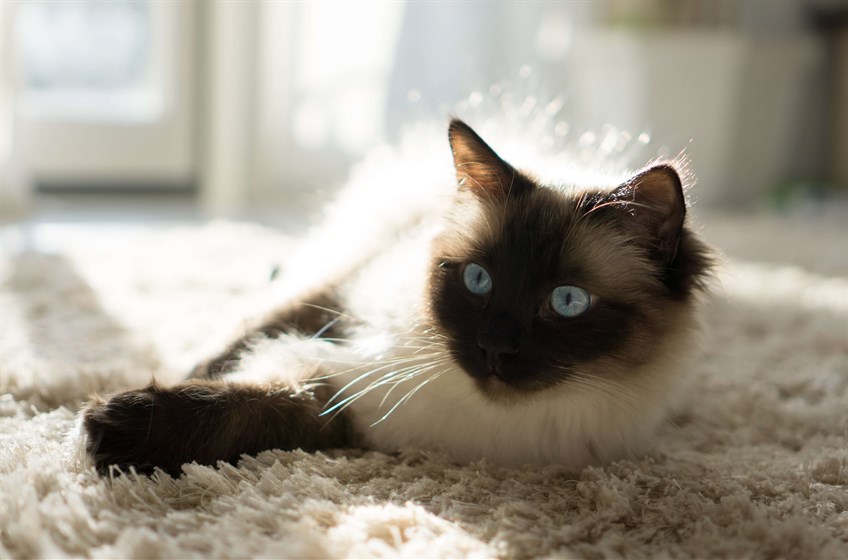Why grain-free is good for cats
Published date: 13 February 2020

Our own dietary needs – our intolerances, allergies and preferences – are extending beyond the dinner table and into our feline friends' food bowls. With good reason – like humans, no two cats are the same. Therefore, it's essential that what we dish up is packed with a balance and combination of nourishing ingredients that are kind to their tummies. This will only benefit their wellbeing in the long run, so they stay happy and healthy.
The nutritional experts at Canagan have spent time researching how to mimic your pet's ancestral diet, and their findings highlight the many benefits of grain-free food for your cat.
CATS NEED A LOT OF MEAT IN THEIR DIET
Cats are ‘obligate carnivores', which means meat is critical to their diets and, at a biological level, for survival. Waking up to a present in the form of a rodent, bird, reptile or fish, delivered by your pet, will come as no surprise to any cat owner. This proves that even domesticated cats relish in hunt-and-kill, just as their ancestors once did in the wild.
WHAT IS GRAIN-FREE CAT FOOD?
Grain-free cat food is just as the name describes, food without cereal grains. These include the following:
- Barley
- Corn
- Oats
- Rice
- Wheat
Grain-free food is high in animal protein which is especially important as cats cannot synthesise certain essential nutrients that are imperative for their survival, including the amino acids taurine and arginine, so these elements must be sourced from meat. While cats are obligate carnivores and could eat meat alone, it's worth considering introducing vegetables to a protein-heavy dish in the interests of a balanced diet. After all, the added nutritional value can only be a good thing.
A SIDE OF VEGETABLES
Vitamin deficiencies can lead to a number of health issues in cats, and there are a few items that help to provide some of those vital minerals for our beloved dogs and cats in fact!
CRANBERRIES
Cranberries are often added to cat food to aid urinary tract health and prevent kidney disease. They also contain nutrients that fight plaque from forming on their teeth. Overall, these small fruits are an excellent source of vitamins E, C and K, as well as containing good amounts of copper, potassium, iron and magnesium.
SWEET POTATOES
Sweet potatoes are a potent antioxidant brimming with beta-caroateone, which converts to Vitamin A in your pet. They are a great natural energy source which work to aid digestion and to promote strong muscles, bones and eyesight.
WHAT ARE THE BENEFITS OF GRAIN-FREE CAT FOOD?
Protein is king. Scientifically speaking, your cat is a carnivore and just like their great, great grandparents, they thrive on a diet that is high in protein. It's such an important component for their energy metabolism, maintenance of lean body muscle, strong eyesight, good skin condition and thick, glossy coats. Grains were never on the menu for their ancestors, nor the cats that still roam in the wild today.
Similar to a gluten free diet for humans where many experience bloating, feeding your cat high grain diets can add strain to your pet as their bodies are not designed to digest this particular food family.
A grain-free diet can benefit your cat if they have food allergies, or certain sensitivities. Signs of a reaction can include:
- Itchiness
- Extreme hair loss
- Bald patches
- Inflamed skin
- Sores and scabs
A trial would be advised to determine if you pet has any allergies and if you can spot one of more of these worrying signs, you must take a visit to your local vet.
HOW TO SWITCH YOUR CAT'S DIET TO GRAIN-FREE
Cat owners should know that it is important to switch your cat's food gradually to avoid digestive upset. If you're keen to get started making the transition slowly by incorporating the new food into your cat's old food. Start with 90% old food and 10% new food and slowly alter the proportions week by week. During this period, keep an eye on your cat's toilet breaks as much as possible to make sure they are not suffering with anything out of the ordinary, such as constipation or diarrhoea.
As always, it is a good idea to consult your vet before making the transition to ensure it is the best decision for your cat.
If you decide a grain-free diet is the right choice for your pet then explore Canagan's high quality cat grain-free food to find a recipe that they will love.
*The content is not intended to be a substitute for professional medical advice, diagnosis, or treatment. Always seek the advice of your veterinarian or other qualified pet health provider with any questions you may have regarding your pet's health*




Comments
There are currently no comments, be the first to comment.